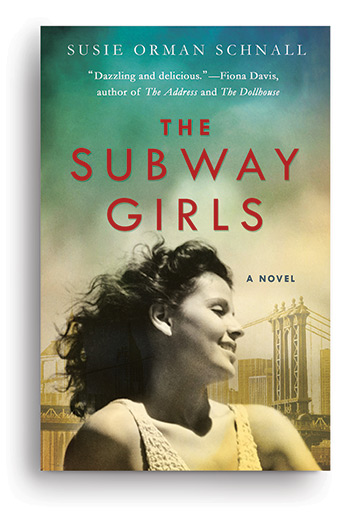
In The Subway Girls, Susie Orman Schnall explores a midcentury advertising campaign’s modern-day echoes.
The Subway Girls: A Novel
By Susie Orman Schnall C’92
St. Martin’s Griffin
When writer Susie Orman Schnall C’92 first heard a National Public Radio story about the New York women once known as “Miss Subways,” she knew she’d found the subject of her next novel. From the 1940s to the mid-1970s, Miss Subways were beauty contestant winners selected for an advertising campaign promoting the New York metro. In her 2018 novel The Subway Girls, Schnall filters that history through the perspective of a modern-day female advertising executive who rediscovers it. Praised in publications like Us Weekly, Harpers’ Bazaar and InStyle magazine as a “summer must” and “best beach read,” The Subway Girls also exemplifies Schnall’s abiding interest in harmonizing time spent at home and at work.
Work-life balance is a recurring theme in Schnall’s fiction, which typically features likeable but slightly overthinking women who struggle to manage the joys and responsibilities of modern life. Her 2014 debut novel, On Grace, tells the story of an affluent wife and mother facing personal and professional crises on the brink of turning 40. The protagonist counts her blessings but can’t help but “wonder if this is just a blissful moment before I’m about to get killed by some idiot driver.” Such wry counterpointing of familiar platitudes about gratitude is an engaging aspect of Schnall’s voice. Similarly, her follow-up novel, 2015’s The Balance Project, explores the chaos behind the apparent perfection of a Gwyneth Paltrow-type lifestyle guru, as well as its disastrous effects on the entrepreneur’s long-suffering personal assistant.
Both On Grace and The Balance Project exhibit Schnall’s sensitive depiction of momentous phases in women’s lives, edged with wry skewerings of the carefully curated lives of the privileged, in their “large Manhattan apartments [with their] Dyptyque or DayNa Decker candle, a beautiful low arrangement of single-hued flowers, a crystal dish filled with nuts or wrapped candies, and a neat stack of urbane coffee-table books published by Rizzoli.” Her vulnerable but optimistic protagonists lament the “many mixed messages about what women are supposed to do,” and are appealing because they give voice to the suspicion that the notion that one “can have it all” only serves to “make women feel inadequate.”
This mix of optimism and critique is especially apparent in The Subway Girls’ 1940s period plot. As one Miss Subways contestant in the novel remarks, “the times may have changed, but the identity crises we all go through don’t.”
The Subway Girls is Schnall’s first work of historical fiction, and it is further enriched by the author’s professional expertise. After graduating from Penn and before having children, Schnall spent more than a decade working in New York in marketing and advertising. The Subway Girls draws on her familiarity with that industry to convey the excitement that goes into creating and launching a successful advertising campaign. It also gives Schnall’s longstanding interest in balancing home life and career an extra dimension. While it explores the choices and challenges that women face as they make their way in their chosen professions, The Subway Girls also indicts the unrealistic standards that advertising specifically imposes. The novel’s critique of female objectification resonates with the #MeToo zeitgeist. In The Subway Girls’ modern-day storyline, both the young advertising executives and the mature former Miss Subways struggle to come to terms with the campaign, which was “developed by men … written by men, [and] photographed by men.” Their insights about consent and choice reprise and cast new light on plot revelations in the 1949 storyline, as the 21st-century women recognize the “irony that a woman’s gender could be both a liability and an asset.”
Media, and especially social media, loom large in Schnall’s stories. Her plots pulse with Facebook flirting, the ping of text messages and email, and ambivalent attitudes about “duck-faced group selfies, look at-my-exotic dinner shots, and destination-wedding sunsets.” Schnall depicts these sites of digital self-representation because she is acutely aware of how such activities can both enhance communication and lead people astray. In her fiction, the pitfalls of social media can be professional as well as romantic and domestic. Her nonfiction explores similar territory. In The Balance Project Interviews, a “passion project” blog, Schnall interviews women she admires for their insights and advice about balancing personal and professional priorities. (Some of her subjects include actress Reese Witherspoon, Girls Who Code founder Reshma Saujani, SPANX founder Sara Blakely, and the Skimm founders Carly Zakin C’08 and Danielle Weisberg [“Alumni Profiles, Mar|Apr 2017].) After pivoting from The Subway Girls toward a new project, Schnall purposefully dialed down her social media activity in a deliberate effort to “follow her own advice” about making time for her personal life.
Schnall’s next novel is the forthcoming The Summer of Tomorrow, which is set at the 1939 World’s Fair. Like The Subway Girls, it will feature two protagonists chasing professional goals despite chauvinism and gender traps. An aspiring actress must protect herself against predations on the casting couch, and a driven young journalist struggles to make her voice heard amidst the gritty boys’ club culture of the newsroom. She calls her writing an exploration of “invisibility, discrimination, sexual exploitation, and diminished expectations.”
It has been an effective formula. An Italian edition of The Subway Girls appeared earlier this year, demonstrating the broad appeal of what might otherwise seem a very geographically and temporally specific story. But like the New York background to the World’s Fair setting in the forthcoming The Summer of Tomorrow, Schnall’s novels use that city—and her recent shift to historical fiction—as a way to address issues and experiences that are universal to women in our, and perhaps any, era.
Karen Fang C’94 is professor of English at the University of Houston, where she also leads a college initiative in media studies.

